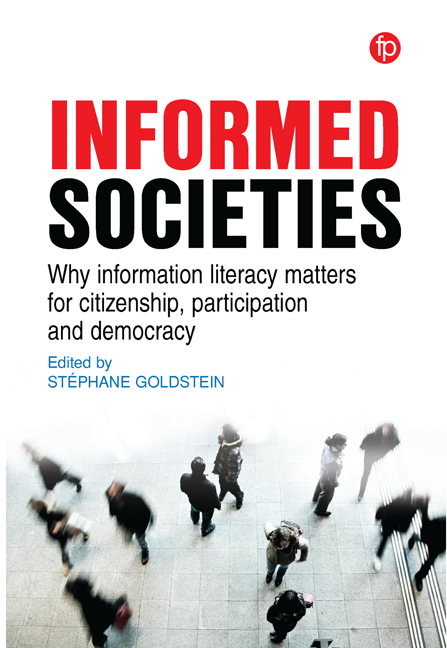Book contents
- Frontmatter
- Contents
- Figures and Tables
- Notes on the authors
- Foreword
- Introduction
- 1 Information Literacy in the Digital Age: Why Critical Digital Literacy Matters for Democracy
- 2 The Discourses of Power, Information and Literacy
- 3 What Intellectual Empathy Can Offer Information Literacy Education
- 4 The ‘Post-Truth’ World, Misinformation, and Information Literacy: a Perspective From Cognitive Science
- 5 Media and Information Literacy: Intersection and Evolution, a Brief History
- 6 Information Literacy and National Policy Making
- 7 Information Literacy as a Growth Pillar for a Fledgling Democracy
- 8 Information literacy and the Societal Imperative of Information Discernment
- 9 Libraries and Democracy: Complementarity in a Regime of Truth
- 10 Scottish Public Libraries Welcome Syrian New Scots: a Transition from Being a Refugee to Becoming an Active Part of the Community
- 11 Information Literacy, Lifelong Learning and the Needs of an Ageing Population
- Index
6 - Information Literacy and National Policy Making
Published online by Cambridge University Press: 22 February 2020
- Frontmatter
- Contents
- Figures and Tables
- Notes on the authors
- Foreword
- Introduction
- 1 Information Literacy in the Digital Age: Why Critical Digital Literacy Matters for Democracy
- 2 The Discourses of Power, Information and Literacy
- 3 What Intellectual Empathy Can Offer Information Literacy Education
- 4 The ‘Post-Truth’ World, Misinformation, and Information Literacy: a Perspective From Cognitive Science
- 5 Media and Information Literacy: Intersection and Evolution, a Brief History
- 6 Information Literacy and National Policy Making
- 7 Information Literacy as a Growth Pillar for a Fledgling Democracy
- 8 Information literacy and the Societal Imperative of Information Discernment
- 9 Libraries and Democracy: Complementarity in a Regime of Truth
- 10 Scottish Public Libraries Welcome Syrian New Scots: a Transition from Being a Refugee to Becoming an Active Part of the Community
- 11 Information Literacy, Lifelong Learning and the Needs of an Ageing Population
- Index
Summary
Introduction
The relationship between information literacy (IL), national policy making and high-level national action has attracted surprisingly little attention in the wider world of information literacy research and development, given that it is reasonable to expect the production of an overarching strategy within which to situate specific aspects of information literacy. This chapter will explore the issues and problems in developing national IL strategies.
It is also the case that there is something of a backstory to IL and national policy making. The Prague Declaration (UNESCO, 2003) explicitly recognised IL as an all-encompassing phenomenon, a concern for all sectors of society and key to the social, cultural and economic development of nations, communities, institutions and individuals in the 21st century and beyond. The Alexandria Proclamation (Garner, 2005) reiterated some of these points, stating that IL provides the key to support economic development, education, health and human services. It also noted that IL encompasses learning, critical thinking and interpretative skills across professional boundaries and empowers individuals and communities, a point which will be returned to later. IL, therefore, can be interpreted as being about personal and civil rights, participative citizenship, lifelong learning, skills and financial well-being, education and critical thinking and the maintenance of a healthy lifestyle. Paul Zurkowski, who coined the term information literacy, emphasised the importance of the workplace (Bawden, 2001), describing information-literate people as ‘People trained in the application of information resources to their work…’. But in the 1990s IL was taken up enthusiastically by academic librarians, who saw it as a natural progression from bibliographic instruction and who came to dominate the IL agenda. In higher education information came to be linked with the idea of a hierarchy or laddering of skills, as exemplified by the SCONUL Seven Pillars of Information Literacy (SCONUL, 2011). However, such a concept was less suited to IL activity in other sectors. Academics came to be concerned with learning outcomes and pedagogy which are susceptible to measurement, while public librarians were more con - cerned with social inclusion, which is less so (Crawford and Irving, 2013, 22–23).
Scoping national information literacy activities
Serious attention to sectors other than higher education is of more recent interest. In 2014 a study by Whitworth (2014) revealed that 60% of the IL literature relates to higher education.
- Type
- Chapter
- Information
- Informed SocietiesWhy information literacy matters for citizenship, participation and democracy, pp. 111 - 128Publisher: FacetPrint publication year: 2019

